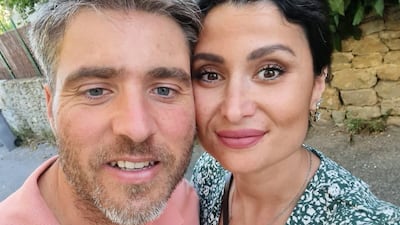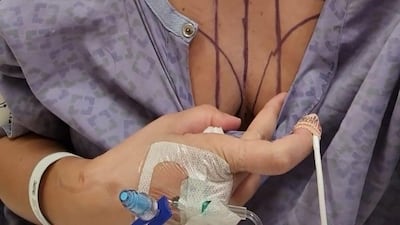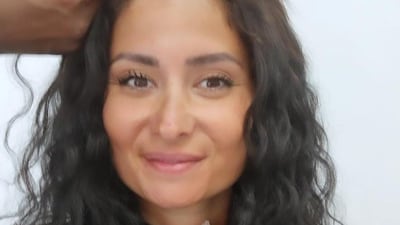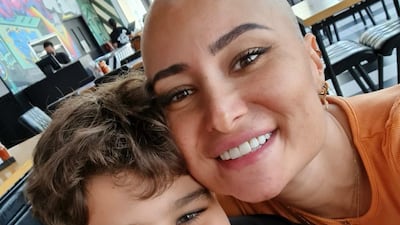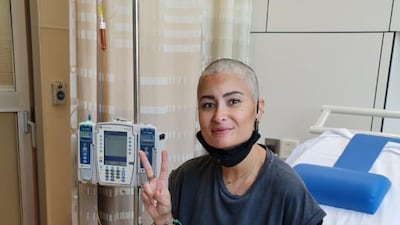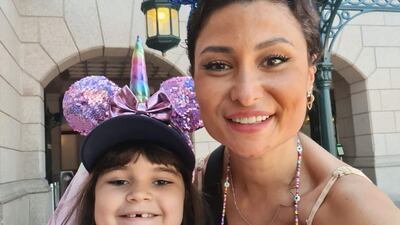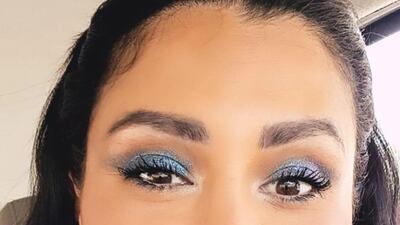Cancer survivor Sarah Agha knows it might sound strange to say she is grateful for all she has endured.
The 38-year-old was forced to have her breasts, uterus and ovaries removed last year as an unforgiving disease spread through her body and an Abu Dhabi clinic became her second home.
But she firmly believes she has triumphed over adversity and now loves herself more than before.
She recalls a time shortly before cancer entered her life when, unhappy with her appearance, she scheduled cosmetic surgery.
“Right before I discovered I had breast cancer, I had scheduled an appointment with a plastic surgeon because I wasn’t happy with how my breasts looked and now I lost them,” said Ms Agha, who is from Syria and has two children.
'I started loving myself'
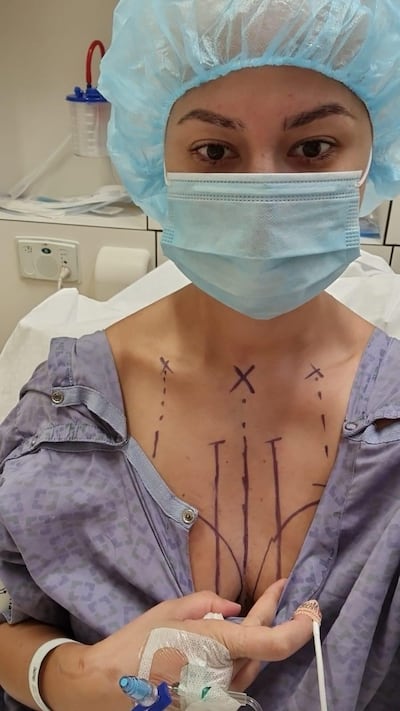
“I wasn’t happy with my hair and I became bald. I wanted to be thinner and now I gained weight because of all the chemotherapy and treatment.
“I was never happy with what I had and I lost everything that I wasn’t happy with.
“But now because of cancer, I started loving myself.”
Ms Agha is eager to share a message of hope with others as the world marks Breast Cancer Awareness Month in October.
She speaks of the crucial importance of early screening, but also emphasises the need to be mentally ready for all challenges that may lie ahead.
She discovered she had cancer after noticing a lump on the top of her right breast in 2021.
“I thought it was some fat tissues and didn’t think anything of it. I had no symptoms and only went for an ultrasound because the lump was getting bigger and for peace of mind but it ended up becoming that phone call where they tell you it is cancer,” she said.
Tests at Cleveland Clinic Abu Dhabi also showed that she had a genetic mutation and the chances of the cancer reoccurring was high.
This convinced her that having a double mastectomy and her uterus and ovaries removed was the right move.
“I removed everything to get over with it. I was left bald and fatter and with a lot of losses. I felt that I was developing anxiety attacks but I got over it and I know that this is strange for me to say, but I am now actually grateful for it.
“I am in a very good place right now. I learnt to love myself more.
“I started feeling good about myself and inadvertently taught my children valuable lessons, too. I taught them that everything will pass no matter how bad it is and told them to love themselves.
“I put myself first now and my family.”
Stay strong in face of adversity

Ms Agha had all her surgeries at Cleveland Clinic Abu Dhabi and is grateful for the steadfast support of medical staff.
She is also an advocate for cancer patients and regularly gives awareness talks to patients and survivors through her social media.
“I learnt that you are never too young to get cancer so you need to get checked. If you can’t get a mammogram then an ultrasound is good enough.”
Breast cancer remains the most common form of the disease in the UAE, a recent study conducted by the Emirates Oncology Society showed a 3.1 per cent decline in cases of advanced stage breast cancer, with awareness of the importance of early detection believed to be key.
If you do get a cancer diagnosis, much of the battle lying ahead is fought in the mind, Ms Agha said.
“I think everything is in your head. I believe that if you feel safe and confident in your head then it will be reflected on your body. It was bad, don’t get me wrong, but not as bad as I expected it to be.”
“This year, I want to tell every woman who is going through this, that it will pass. I know you feel like you are in an endless black hole but it will end and you will come out a new and changed person.”
Genetic tests such as the BRCA which provides information about inherited genetic mutations and the Oncotype DX test which analyses the genetics of the tumour itself are especially useful in helping to make a decision in treatment options.
Support of loved ones is vital
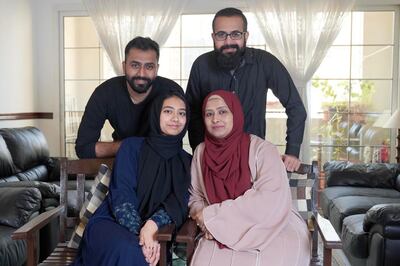
Breast cancer patients have told of how family and friends rallied round at their moment of need.
Mother of two Marsha Nembhard, 47, said her husband rose to the challenge.
She was treated at Tawam Hospital, where she said doctors told her that cancer was no longer a death sentence.
“I saw a side to my husband at the stage of my life that I had never seen before. He was my rock,” she said.
Niloufer Abdul Hameed, 49, from India said that her biggest fear was how cancer would affect her family.
The mother of four felt a lump on her left breast two years ago and required a mastectomy.
“That feeling when you are first told you are positive for cancer is very scary. I remember that I stood up suddenly and the whole world felt like it was spinning.
“My husband was there for me at each and every appointment. Then my children, my neighbours, my friends, my siblings — everyone was so supportive.
“As you know, early detection is key to survival — this cancer doesn't discriminate and doesn't know nationality or status but having that support and a positive outlook is equally important.
“I was a third stage cancer patient and now I am cured.”
